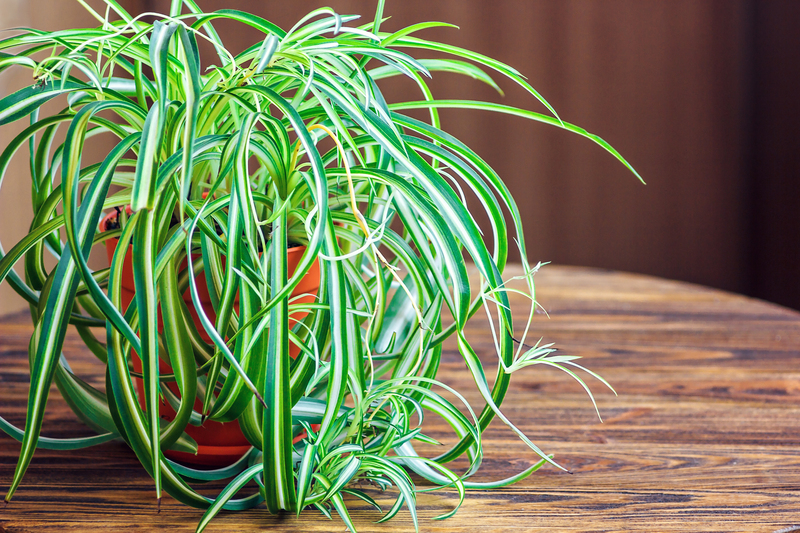Spice Up Life with Your Own Herb Garden
Posted on 08/09/2025
Spice Up Life with Your Own Herb Garden
Imagine stepping out your doorstep and plucking a sprig of fresh basil for your pasta or a handful of mint for your tea. Herb gardening is one of the easiest and most rewarding ways to enhance your cooking, beautify your space, and bring a sprinkle of nature's magic into your daily life. Whether you have a sprawling yard or a compact apartment, cultivating a home herb garden can spice up your life in more ways than one. In this comprehensive guide, let's explore how to create, maintain, and make the most out of your very own herb haven.
Why Grow Your Own Herb Garden?
- Freshness at Your Fingertips: Supermarket herbs start losing flavor the moment they're picked. Growing them at home ensures peak aroma and taste with every harvest.
- Cost-Effective Cooking: Herbs can be pricey in stores. A single packet of seeds can yield hundreds of fresh sprigs over the season.
- Natural Beauty: Herb plants like lavender and sage not only smell heavenly but also brighten up your space with their lush foliage and flowers.
- Healthier Lifestyle: Homegrown herbs are organic and chemical-free, perfect for cleaner eating.
- Therapeutic Benefits: Gardening itself is a proven way to reduce stress and boost happiness.
Starting a herb garden at home is more than just a culinary upgrade; it's a lifestyle boost. Next, let's dive into how you can get started, wherever you live.

Choosing the Best Location for Your Herb Garden
All herbs adore sunlight. Most need at least 6 hours of direct sun daily. So first, evaluate the available spots in your home:
- Outdoors: Gardens, patios, balconies, window boxes--any sunny spot is game! Raised beds are great for larger collections.
- Indoors: A windowsill with good southern or western exposure works wonders. Grow lights offer a solution in low-light apartments.
Pro Tip: For beginners, start with a few pots--you can always expand as your confidence grows!
Picking the Right Herbs to Spice Up Your Life
The best herbs to grow are the ones you love to use! Here's a list of easy, popular options suitable for both novice and seasoned gardeners:
Top Culinary Herbs for Beginners
- Basil: Versatile and fast-growing, essential for Italian and Mediterranean cuisine.
- Mint: Perfect for teas, salads, and desserts. Grows quickly--best kept in pots to avoid spreading.
- Parsley: Adds freshness to everything from soups to salads. Biennial, but often grown as an annual.
- Cilantro/Coriander: Essential in Mexican, Indian, and Asian dishes. Likes cooler weather.
- Rosemary: Evergreen and aromatic, ideal for meats and vegetables. Loves full sun.
- Thyme: Low-growing, drought-resistant; great for just about every dish.
- Chives: Mild onion flavor for salads, eggs, and more.
- Dill: Fantastic for pickles, fish, and salads. Attracts pollinators too!
Other Interesting Herbs to Try
- Sage: For stuffing, meats, and herbal teas.
- Oregano: Pungent and perfect for pizza, pasta, and more.
- Lavender: Great for fragrance, teas, and desserts.
- Lemon Balm: Offers a gentle lemon scent, fantastic for teas and soothing remedies.
Plant a mix of these favorites and create a diverse herb garden that caters to your tastes and culinary adventures.
How to Start Your Herb Garden: Step-by-Step
1. Gather Your Materials
- Pots or containers with drainage holes
- Quality potting soil or garden soil enhanced with compost
- Seeds or starter plants (seedlings)
- A watering can or spray bottle
- Labels (optional, but useful for identifying herbs)
2. Planting Your Herbs
- From Seeds: Follow packet instructions carefully--some seeds need light to germinate, others should be covered.
- From Seedlings: Gently remove from nursery pots and plant at the same depth in your container or bed.
- Water right after planting and keep soil consistently moist but not waterlogged.
3. Caring for Your Herb Garden
- Sunlight: Ensure your herbs get at least 6 hours of sun a day. Rotate pots for even growth.
- Watering: Herbs generally prefer slightly dry conditions. Water when the top inch of soil feels dry.
- Feeding: Fertilize with diluted organic fertilizer every 4-6 weeks, especially for container herbs.
- Pruning & Harvesting: Regularly pinch off growing tips to encourage bushier plants and more harvests.
Tip: Always harvest herbs in the morning after the dew has dried but before the day heats up for best flavor and aroma.
Herb Garden Design Ideas to Brighten Your Space
Herb gardens offer flexibility in design and fit any space, big or small. Here are creative ways to personalize your herb patch:
- Vertical Gardens: Maximize wall space with hanging pots, wall planters, or stacked pallets filled with herbs.
- Windowsill Gardens: Line up pots on kitchen or living room sills for both beauty and convenience.
- Spiral Gardens: Create a spiral mound outdoors with rocks or bricks, planting herbs with different sun and water needs on each level.
- Mason Jar Gardens: Grow herbs in jars mounted on boards--great for rustic kitchens!
- Tea Cup Gardens: Plant short herbs like thyme or basil in vintage tea cups for whimsical decor.
Whether you choose a single pot of basil or a lush outdoor bed, your herb garden will spice up your lifestyle both visually and gastronomically.
Solving Common Herb Gardening Problems
Disease and Pests
- Aphids: Spray leaves with a water and mild soap solution.
- Powdery Mildew: Improve airflow, don't overwater, and remove affected leaves promptly.
- Root Rot: Always use well-draining soil and don't overwater!
Herbs Growing Leggy or Weak
- Ensure they're getting enough sunlight.
- Pinch off the top growth regularly and provide gentle support if needed.
Why Are My Herbs Not Flavorful?
- Harvest before the plant flowers, as leaves lose flavor once blooming starts.
- Avoid using too much fertilizer--this can make herbs taste bland.
With a little attention and care, your home herb garden will thrive and reward you season after season.
Harvesting and Preserving Herbs to Enjoy Year-Round
How to Harvest Your Herbs
- Use clean, sharp scissors to cut stems just above a leaf node.
- Never cut more than 1/3 of the plant at one time.
- Harvest often; it encourages fuller, bushier plants.
Ways to Preserve Your Homegrown Herbs
- Drying: Hang bundles upside down in a cool, dry, airy spot. Once dry, store in airtight containers.
- Freezing: Chop herbs and freeze them in ice cube trays with water or olive oil. Perfect for soups and stews.
- Herb-Infused Oils: Steep sprigs in olive oil for flavorful additions to any dish.
- Herb Vinegar: Infuse vinegar with basil, tarragon, or thyme for zesty dressings and marinades.
Preserved herbs bring a touch of your garden's vibrancy to meals all year long. Gift jars of dried herbs or homemade blends to friends for a personal, aromatic treat!
Delicious Ways to Use Your Fresh Herbs
- Homemade Pesto: Blend basil, pine nuts, parmesan, olive oil, and garlic into a flavorful sauce.
- Infused Water & Teas: Mint and lemon balm offer refreshing twists to drinks.
- Herb-Buttered Veggies: Creamy chive or dill butter on potatoes and corn is irresistible.
- Salad Dressings: Whisk fresh oregano or tarragon into vinaigrettes for a garden-fresh flavor boost.
- Garnishes: Snip parsley, chives, or thyme onto soups, eggs, or pizza just before serving.
Don't stop at the kitchen--try crafting your own herb sachets, bath infusions, or natural cleaning sprays for a fully herbal lifestyle!

Frequently Asked Questions About Herb Gardening
Can I Grow Herbs Year-Round?
Yes! Many herbs thrive indoors on sunny windowsills, even in winter. Consider using grow lights for extra help during darker months.
Are Homegrown Herbs Really More Flavorful?
Absolutely. The fresher the herb, the more aromatic and potent its oils. Supermarket herbs are often picked days before reaching your plate. Growing your own ensures unbeatable taste.
Which Herbs Are Easiest for Beginners?
Basil, mint, chives, parsley, and thyme are especially beginner-friendly. Mint is virtually unkillable (just keep it in a pot), and chives tolerate some neglect!
Do Herbs Need Fertilizer?
Yes, but only lightly--over-fertilizing can lead to leafy but bland plants. Use diluted organic fertilizer once a month or mix compost into your soil at planting time.
Conclusion: Enrich Your Life, One Herb at a Time
Creating your own herb garden is a surefire way to spice up your life. It's fun, affordable, and healthy, offering a connection to nature and the freshest flavors for your food. Start small or go big--every sprout you nurture brings joy and satisfaction straight to your table.
So why wait? Gather your seeds, get your hands dirty, and let the aromas and tastes of your personal herb garden transform everyday moments into something extraordinary. Happy gardening, and happy tasting!
Latest Posts
A Pup's Paradise: Landscaping for Doggie Delights
Enhance Your Outdoor Experience with 3 Essential Weed Tips
Greening the Earth with Recycled Organic Matter

